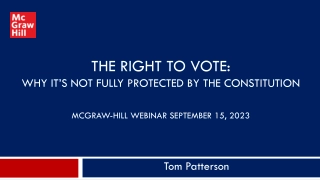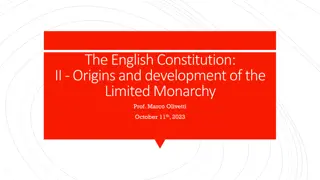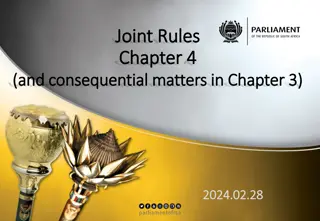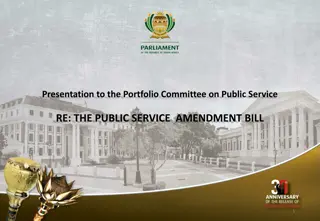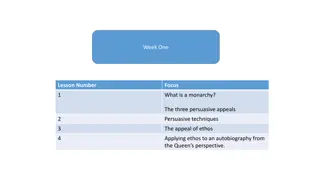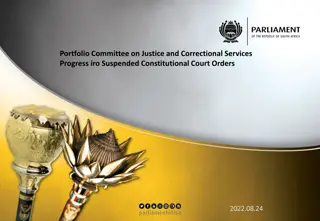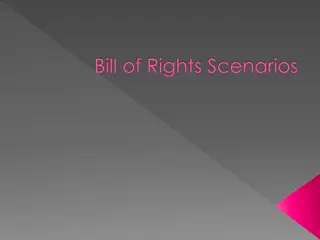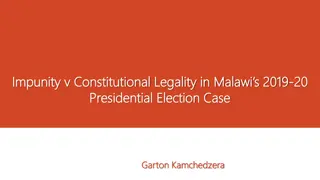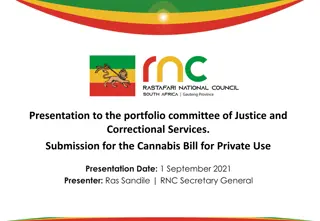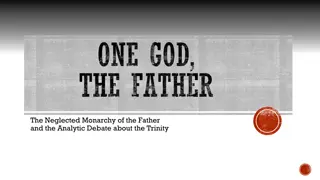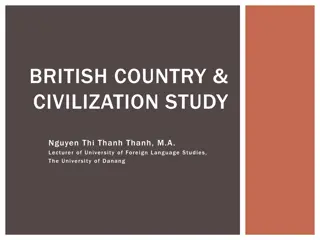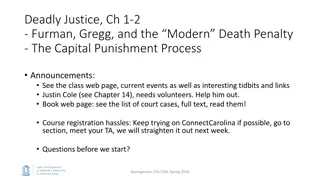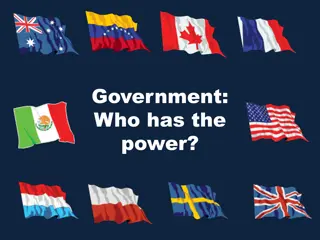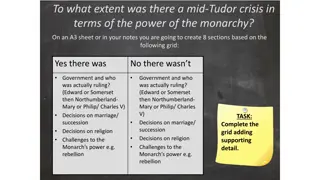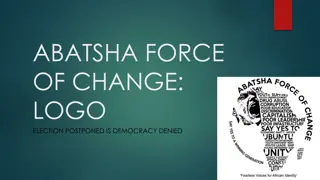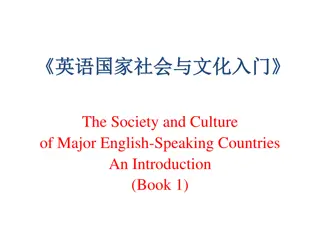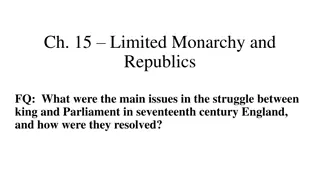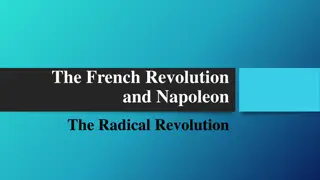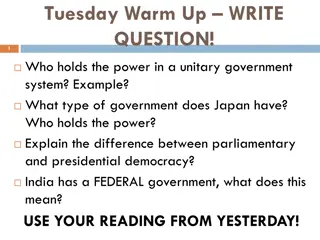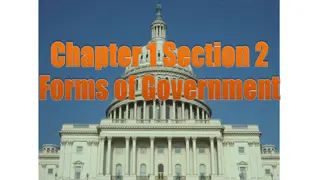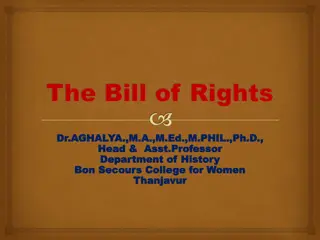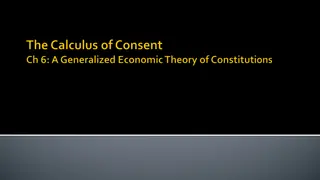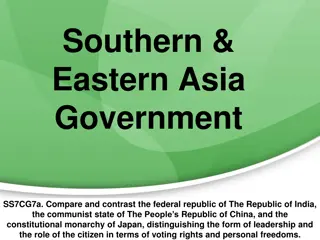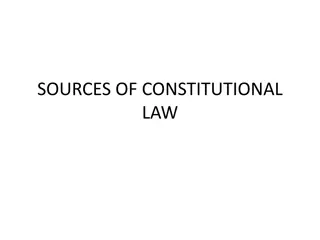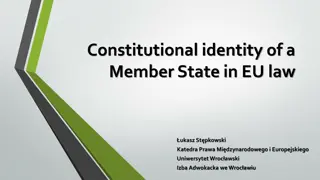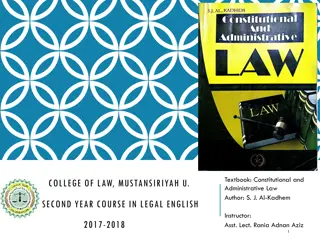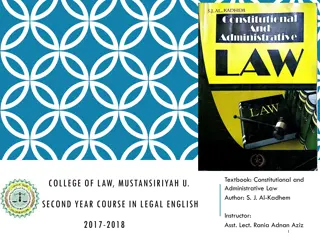The Right to Vote
Join Tom Patterson in this McGraw-Hill webinar on September 15, 2023, as he discusses the conflicting constitutional provisions for the right to vote and the impact on Supreme Court decisions. Explore the politics of ballot access and the historical context of voter suppression. Learn about key poin
2 views • 38 slides
Redress and U.S. Constitutional Constraints
Explore the intersection of redress and U.S. constitutional constraints within the Data Privacy Framework, addressing issues of standing, independence, foreign affairs, and national security. Proposals for individual redress mechanisms, including the role of the Data Protection Review Court, are dis
0 views • 13 slides
Challenges of Constitutional Reform in Nigeria: A Comprehensive Analysis
Delve into the complexities of Nigeria's constitutional reform efforts since the Fourth Republic began in 1999. Explore the structural, institutional, and historical drivers of constitutional conflict, from a deeply divided society to issues of federalism and ethnic autonomy. Assess the challenges a
0 views • 35 slides
Evolution of Limited Monarchy in English Constitution
The development of limited monarchy in the English Constitution is traced from Anglo-Saxon Britain through the introduction of feudalism. This system of governance established a complex relationship between the king, lords, and vassals, leading to the formation of the King's Council and the origins
0 views • 19 slides
Understanding Separation of Powers in Constitutional Law
Explore the concept of separation of powers in constitutional law, as depicted through the lens of the Diploma in Law program from Malta. Learn about the principles of checks and balances, the relationship between the Executive and the Legislature, and the significance of the rule of law in a democr
0 views • 10 slides
Proposed Amendments for Enhanced Mediation Procedures and Constitutional Review
Proposals for improving mediation processes in parliamentary procedures, including the establishment of mediation committees and clarifying timeframes. Additionally, suggestions to enhance the role of the Constitutional Review Committee in scrutinizing Constitution Amendment Bills.
1 views • 23 slides
Constitutional Court judgments with suspended orders.
The Constitutional Court in South Africa has issued judgments with suspended orders in various cases relating to Acts that were deemed inconsistent with the Constitution. Orders in cases like the Riotous Assemblies Act and Drugs and Drug Trafficking Act are set to lapse on specific dates unless the
4 views • 44 slides
Presentation to Portfolio Committee on Public Service Regarding Public Service Amendment Bill
The presentation addresses the legal and constitutional issues within the Public Service Amendment Bill, focusing on the insertion of a new clause prohibiting heads of departments from holding political office. It delves into the constitutional framework and limitations of rights, emphasizing the ne
3 views • 20 slides
Understanding Monarchy: A Study in Persuasive Appeals
Introduction to the concept of monarchy as a form of government and its various manifestations, exploring persuasive appeals and the application of ethos through the perspective of a queen. The content delves into the role of a monarchy in modern society and encourages critical analysis through tran
10 views • 18 slides
Understanding the Constitutional Background of Sparrow Case
Providing a comprehensive contextual understanding of the Sparrow case is crucial beyond just teaching the basic interpretive framework. The historical background of Sparrow, rooted in colonial imperialism and Indigenous sovereignty, shapes the constitutional rationale behind the interpretation of s
0 views • 10 slides
Progress Report on Suspended Constitutional Court Orders - Portfolio Committee Update
Progress report on suspended Constitutional Court orders related to various cases such as Minister of Justice and Constitutional Development v. Prince, Sonke Gender Justice NPC v. President of South Africa, and more. Updates on bills, amendments, and plans presented by the Portfolio Committee on Jus
0 views • 9 slides
Bill of Rights Violations in Legal Scenarios
Various scenarios depicting violations of constitutional rights in the legal system, such as denial of the right to counsel, jury trials, cruel punishment, and infringements on the right to keep and bear arms through illegal searches. These violations illustrate the importance of upholding constitut
0 views • 26 slides
Impunity vs. Constitutional Legality in Malawi's 2019 Presidential Election Case
Explore the conflict between impunity and constitutional legality in Malawi's 2019 Presidential Election case. The concept, approach, and argument related to allopoietic law implementation, interpretative inquiry, and rejection of mediocrity are discussed in detail. The battle against impunity and m
0 views • 10 slides
Submission for Cannabis Bill for Private Use by Rastafari National Council
The Rastafari National Council (RNC) presents a submission to the Portfolio Committee of Justice and Correctional Services regarding the Cannabis Bill for Private Use. The RNC, representing over 3 million Rastafarians, emphasizes the importance of fair consultation, equality, and constitutional cons
0 views • 6 slides
Analyzing the Neglected Monarchy of the Father in Trinitarian Debate
Exploring the Monarchy of the Father doctrine and its implications on the Trinitarian debate, this analysis delves into historical context, objections, and influential alternatives like Biblical Unitarianism, shedding light on how reevaluating traditional definitions can reshape theological discussi
0 views • 67 slides
Understanding the British Governmental System and Monarchy
Explore the British governmental system and monarchy with insights into the House of Parliament, House of Lords, House of Commons, Buckingham Palace, and the Royal Flag. Discover the roles and functions of key institutions in the UK's political framework.
0 views • 13 slides
British Country & Civilization Study: Government and Constitution Overview
The British Country & Civilization Study covers various aspects of the United Kingdom, including its government structure, constitution, history, education, and holidays. The UK is a parliamentary democracy with a constitutional monarchy, where the relationship between the State and the people relie
1 views • 41 slides
Evolution of the Death Penalty in the United States
The history of capital punishment in the US, from its early roots in the 17th and 18th centuries to the current constitutional debates surrounding it. The chapters explore landmark court cases and legal interpretations, tracing the evolution of the death penalty and its constitutional implications.
0 views • 26 slides
Understanding Different Forms of Government
An institution known as government establishes and enforces rules for a group of people. This institution must possess sovereignty, legitimacy, and jurisdiction. Various forms of government exist, such as dictatorship, absolute monarchy, and constitutional monarchy, each with distinct characteristic
0 views • 12 slides
Australia - Overview of Geography, Government, and Environmental Challenges
Australia, officially known as the Commonwealth of Australia, is a federal parliamentary state with a constitutional monarchy. The country has a unique landscape, facing challenges such as water management due to its dry climate. Climate change impacts are also a significant concern, making Australi
0 views • 24 slides
Understanding Moral and Constitutional Values in Relation to Judiciary
Explore the concepts of moral values and constitutional values, emphasizing their importance in decision-making processes and societal norms. Discover the stages of moral development and delve into constitutional values such as sovereignty, socialism, secularism, democracy, justice, liberty, equalit
0 views • 9 slides
Examination of the Mid-Tudor Crisis: Power Struggles and Challenges to Monarchy
The mid-Tudor era witnessed a crisis in the power of the monarchy, as evident through issues of government authority, decisions on marriage and succession, religious policy, and challenges to royal power. The complexities of ruling under Edward VI, Mary I, and their advisors, along with crucial even
0 views • 16 slides
Rise of Mussolini in Italy and Weaknesses of the Liberal Monarchy
The historical timeline of Italy before 1919 led to Mussolini's rise to power through various events such as his involvement with the Italian Socialist Party and the formation of the Fascio di Combattimento. Italy's Liberal Monarchy faced weaknesses, including political divisions between progressive
0 views • 35 slides
Understanding Postponement of Elections in a Constitutional Democracy
Abatsha Force of Change (AFC) movement, a non-profit organization in South Africa, aims to empower African youth for social change. With a focus on democracy and constitutional rights, the movement discusses the legal implications of election postponements within the country's governance framework.
0 views • 21 slides
The Government and Monarchy of the United Kingdom: A Historical Overview
Explore the rich history of the United Kingdom's government and monarchy, from the ancient institution of the Monarchy and the role of the Prime Minister to significant events like Magna Carta and the Civil War. Discover the development of Parliament, the birth of the Prime Minister, the roles of th
0 views • 28 slides
Evolution of Human Rights Protection in the EU
The journey of human rights protection in the EU, from the absence of explicit rules to the affirmation of fundamental rights by the CJEU, influenced by case law and the evolution from judicial to codified protection. National courts' concerns on ensuring consistency with constitutional values led t
0 views • 9 slides
Struggle Between King and Parliament in Seventeenth Century England
The seventeenth century in England witnessed a tumultuous struggle between the king and Parliament, revolving around issues such as royal authority, taxation, and religious policies. This conflict culminated in events like the Petition of Right, Charles I's personal rule, and the limitations imposed
0 views • 12 slides
The Radical Phase of the French Revolution: Abolishing the Monarchy
The French Revolution entered its Radical Phase in 1793, marked by violent events such as the abolition of the monarchy, execution of King Louis XVI, establishment of the French Republic, and the subsequent Reign of Terror. Tensions rose as war broke out with various countries, leading to internal c
0 views • 19 slides
Understanding National Governments in Southern and Eastern Asia
Explore the different types of government systems in Southern and Eastern Asia, such as the federal republic of India, the communist state of the People's Republic of China, and the constitutional monarchy of Japan. Learn about the leadership structures, citizen roles, and voting rights in each coun
0 views • 20 slides
Overview of Different Types of Governments and Their Classifications
Governments vary in structure and features, with classifications based on key characteristics like the concentration of power, participation in governance, and the relationship between branches. This overview covers various government types such as autocracy, democracy, oligarchy, and monarchy, high
0 views • 15 slides
The English Bill of Rights: Definition and Impact
The 1689 English Bill of Rights was a pivotal British law passed after the Glorious Revolution of 1688. It outlined the rights and liberties of people, limiting the monarchy's power and establishing a constitutional monarchy in Great Britain. The Bill influenced constitutional developments in North
0 views • 10 slides
Decision Making and Constitutional Rules Behind the Veil of Ignorance
In decision-making for collective actions, individuals behind a veil of ignorance need constitutional rules to govern future decisions. The choice of rules, the expected external costs, and decision-making costs play a crucial role in determining the optimal decision-making rule. By minimizing total
0 views • 16 slides
Government Structures in India, China, and Japan
Comparing the government structures of India, China, and Japan reveals distinct differences in leadership forms, citizen roles, voting rights, and personal freedoms. India operates as a federal republic with a parliamentary system, China as a communist state, and Japan as a constitutional monarchy.
0 views • 37 slides
Political Evolution of Nepal: From Monarchy to Republic
Explore the political history of Nepal from the days of monarchy to the establishment of a republic. Learn about the key players, structures, and societal makeup that have shaped the country's journey towards democracy and governance.
0 views • 11 slides
Understanding the Sources of Constitutional Law
Explore the various sources of constitutional law, including legal basis, formal sources of law, values influencing norms, and the role of jurisprudence. Delve into concepts like Hans Kelsen's method of creating law, the origin of constitutional law, and the factors influencing it. Discover how diff
0 views • 11 slides
Constitutional Identity in EU Law: Evolution and Interpretation
Exploring the concept of constitutional identity within EU law, this article delves into the evolution of this principle from the Treaty of Maastricht to the current Treaty structures. It highlights the notion of respecting national identities and essential state functions, emphasizing the importanc
0 views • 13 slides
Constitutional and Administrative Law Course at College of Law, Mustansiriyah University
Second-year students at the College of Law, Mustansiriyah University, are studying Constitutional and Administrative Law for the academic year 2017-2018. The course covers topics such as the sources of Constitutional Law, including Legislation, Judicial Interpretation, and Conventions. Asst. Lect. R
0 views • 6 slides
Understanding Constitutional and Administrative Law at Mustansiriyah University
Explore the fundamental concepts of Constitutional Law through the course at Mustansiriyah University's College of Law. Delve into the nature of constitutional rules, the essence of constitutional law, and the universal characteristics of constitutions. Understand how constitutional rules reflect th
0 views • 6 slides
The Monarchy in England: From Restoration to Revolution
The content discusses the Restoration of the monarchy in England, the reign of Charles II, the formation of political parties Whigs and Tories, the rise of the Whigs, James II's absolutist aims, and the Glorious Revolution leading to the Bill of Rights in 1689 limiting the monarch's power.
0 views • 8 slides
Understanding Different Forms of Government
Exploring various types of government, from monarchy to democracy, and discussing the roles and structures that define each system. Discover insights into absolute monarchy, constitutional monarchy, and more, shedding light on the diverse ways societies are governed.
0 views • 20 slides
